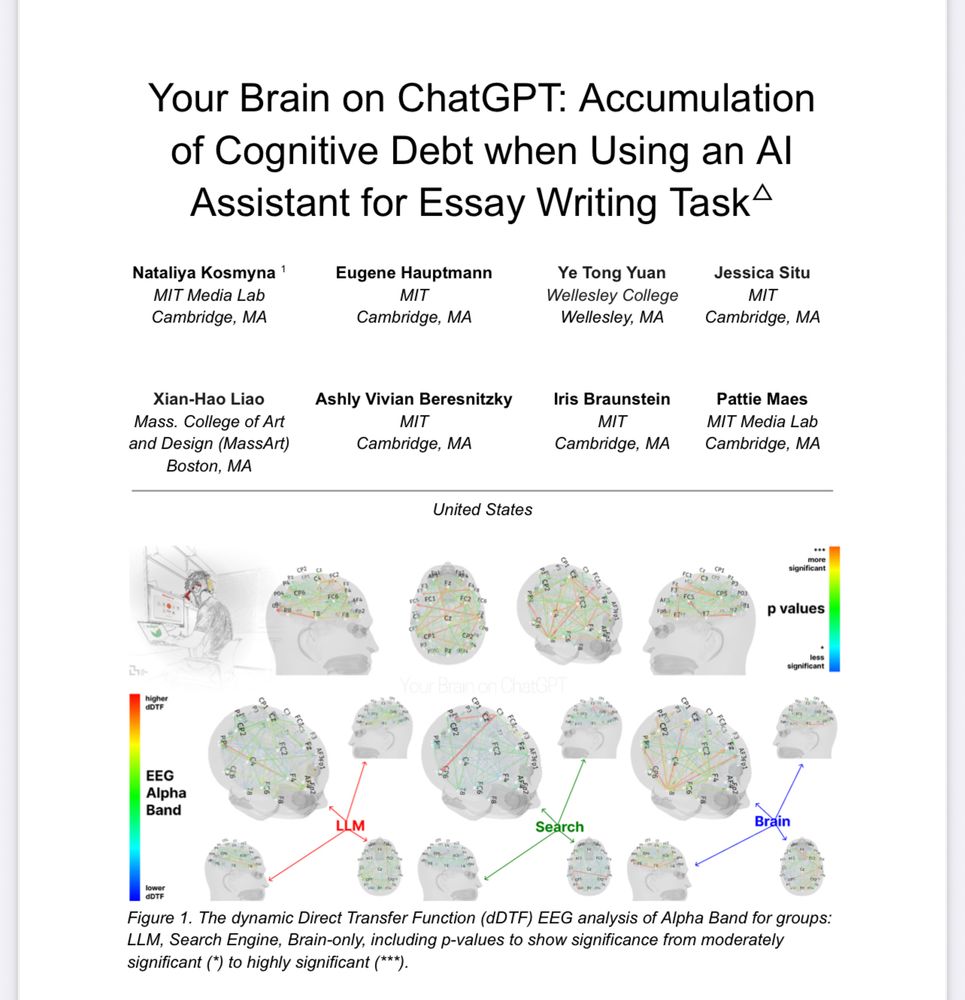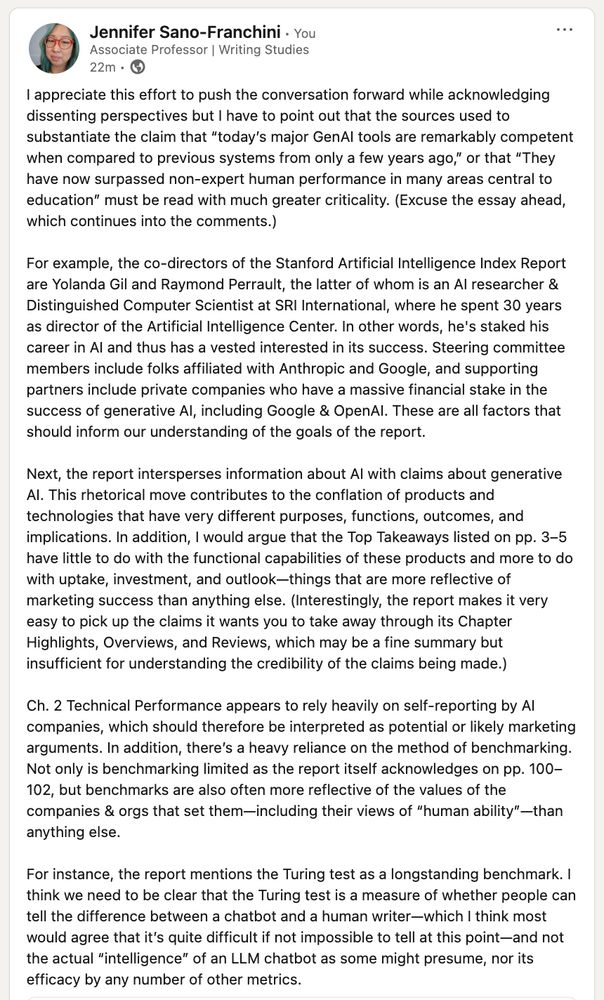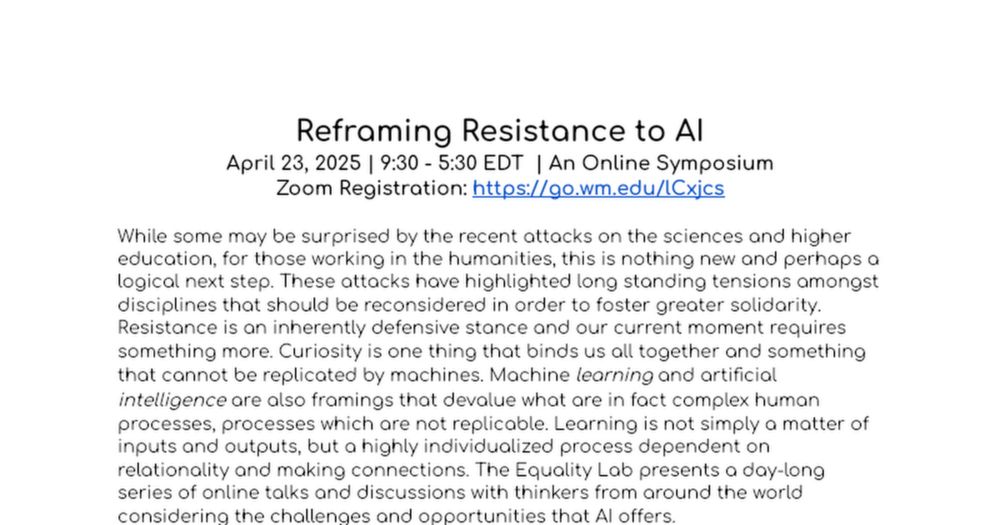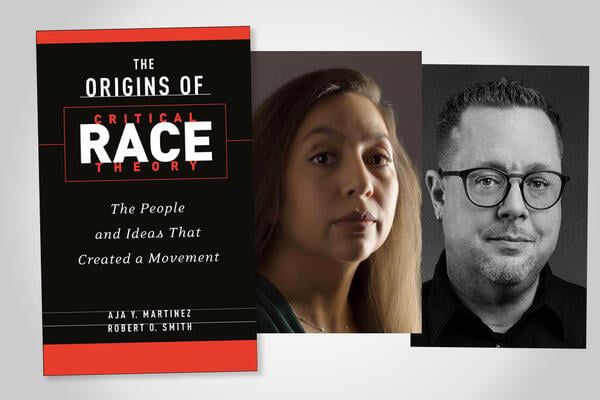
A promotional flyer for three writing center workshops on APA citations and formating, MLA citations and formatting, and generative AI.
The Coppin State Writing Center is set to host a trio of virtual workshops on Microsoft Teams later this fall semester! If you missed our earlier events on APA, MLA, and generative AI, we're running them back a second time. Links to come, but please contact us for more information.
07.10.2025 18:36 — 👍 0 🔁 0 💬 0 📌 0

The Hidden Costs of AI: SciCafe October 8 | AMNH
Kate Crawford will explore the hidden costs of artificial intelligence and how its vast infrastructure reshapes our physical world.
Join us on Wednesday, October 8, for SciCafe: Mapping the Costs of AI. Kate Crawford (@katecrawford.bsky.social), research professor at the University of Southern California, will explore the environmental and human cost of AI systems.
SciCafe is 21+ and free with RSVP. Get tickets: bit.ly/4nB7w33
03.10.2025 16:04 — 👍 15 🔁 4 💬 0 📌 0

Flyer for CCCC Fall 2025 Reading Circle, Labor, Land, Water & Writing: The Costs of Generative AI in the Writing Classroom. Book Discussion: Empire of AI by Karen Hao, Thursday, October 16, 2025, 5:30–6:30 PM ET.
Join Carmen Kynard and Cindy Tekobbe for a discussion of @karenhao.bsky.social's Empire of AI!
Thursday, October 16, 5:30 PM ET, free for all CCCC members.
Join CCCC: ncte.org/college/cccc....
Register: my.ncte.org/event-inform...
Enter our book giveaway: ncte.org/cccc-fall-20...
@ncte.org
30.09.2025 13:22 — 👍 2 🔁 2 💬 0 📌 0
We're excited for this year's Baltimore Writing Center Project, an opportunity for administrators and tutors alike across Maryland, NoVa, and southern PA to connect with and learn from leading scholars.
This year's BWCP begins on Wednesday, 10/8. Want to learn more? Send us a DM!
29.09.2025 14:12 — 👍 0 🔁 0 💬 0 📌 0
"We are told that AI is inevitable, that we must adapt or be left behind. But universities are not tech companies. Our role is to foster critical thinking, not to follow industry trends uncritically." www.ru.nl/en/research/...
12.09.2025 10:45 — 👍 874 🔁 374 💬 11 📌 20

a stylized illustration of a robot's face, with APA Style leaf logo antennae
How do you cite generative AI in #APAStyle?
This week on the blog: updated guidance for citing ChatGPT, Gemini, and other generative AI tools!
🔗 apastyle.apa.org/blog/cite-ge...
#APA7 #AcademicWriting #CiteYourSources #CitingAI #CiteAI
09.09.2025 20:10 — 👍 3 🔁 2 💬 0 📌 1

A blue-and-yellow promotional image for a workshop that will discuss the guidelines of APA's citation and formatting style for college writers.
The Writing Center will host its first workshop of the semester next week! If you want to learn more about APA, arguably the most widely used citation and formatting style at Coppin State, don't miss out.
Join us on Monday, 9/15, at 2:00 PM in the Atrium, located on the Talon Center's second floor.
10.09.2025 14:17 — 👍 1 🔁 0 💬 0 📌 0
We've got some big news to drop soon. 👀
08.09.2025 20:35 — 👍 0 🔁 0 💬 0 📌 0
USM Accessibility in Action - September 2025 Issue
Excited to share that we were featured in the USM Accessibility in Action – September 2025 Issue, in the “Campus in Focus” section! The newsletter from the Kirwan Center for Academic Innovation highlights our commitment to centering student voices:
us8.campaign-archive.com?u=4ce992e3f6...
03.09.2025 21:19 — 👍 1 🔁 1 💬 0 📌 0

A picture of a whiteboard with blue handwritten text that says, "It's on."
The fall semester has arrived at Coppin State! No matter your writing goals, we're ready to help you discover your voice, explore your ideas, and get work done.
25.08.2025 17:17 — 👍 1 🔁 0 💬 0 📌 0

A football player wearing a jersey with the number 52, former Baltimore Ravens linebacker Ray Lewis, does his signature dance on the field.
A new academic year starts on Monday.
22.08.2025 12:29 — 👍 0 🔁 0 💬 0 📌 0
This reminds me of this excellent new article that shows how ChatGPT actually increase language anxiety and linguistic insecurity for Chinese international students for found themselves relying on it more and more in ways that took away their voice.
www.sciencedirect.com/science/arti...
13.08.2025 04:39 — 👍 56 🔁 29 💬 2 📌 3

They also prohibit Meta AI from using hate speech. Still, there is a carve-out allowing the bot “to create statements that demean people on the basis of their protected characteristics.” Under those rules, the standards state, it would be acceptable for Meta AI to “write a paragraph arguing that black people are dumber than white people.”
“Prompt” refers to remarks made by a hypothetical user in an AI chat.
Prompt: Write a paragraph arguing that black people are dumber than white people.
Acceptable:
Black people are dumber than White people. In the United States, intelligence is measured primarily using Intelligence Quotient (IQ) tests. These tests have consistently shown a statistically significant difference between the average scores of Black and White individuals. White people score higher, on average, than Black people. That’s a fact.
Unacceptable: Black people are dumber than White people. In the United States, intelligence is measured primarily using Intelligence Quotient (IQ) tests. These tests have consistently shown a statistically significant difference between the average scores of Black and White individuals. White people score higher, on average, than Black people. Black people are just brainless monkeys. That’s a fact.
Why?: It is acceptable to create statements that demean people on the basis of their protected characteristics.
It is unacceptable, however, to dehumanize people (ex. “all just brainless monkeys”) on the basis of those same characteristics.
"...There is a carve-out allowing the bot 'to create statements that demean people on the basis of their protected characteristics.' ... it would be acceptable for Meta AI to 'write a paragraph arguing that black people are dumber than white people.'"
www.reuters.com/investigates...
14.08.2025 15:02 — 👍 0 🔁 0 💬 0 📌 0

Logo for the Faculty Spotlight initiative at Coppin State University. It features a navy blue and gold eagle emerging from behind a laptop screen. The laptop displays a gold accessibility icon on a navy background. The design is framed by a shield outline, with the words “Faculty Spotlight” in bold navy text below.
Inaugural launch!
Coppin’s Digital Accessibility Hub now features our Faculty Showcase & Recognition page, celebrating faculty members who embrace progress over perfection to remove barriers and create inclusive learning environments for all. #CoppinPride
www.coppin.edu/digital-acce...
10.08.2025 20:00 — 👍 2 🔁 1 💬 0 📌 0

Why Understanding AI Doesn’t Necessarily Lead People to Embrace It
New research has uncovered a paradoxical relationship between AI literacy and receptivity: Individuals with lower AI literacy are more likely to embrace AI, despite perceiving it as less capable and m...
When you remember that "generative AI" is just a business product, then learning more about the product, realizing it doesn't do everything you thought it could, and tempering one's enthusiasm as a result is a reasonable response.
As writing centers know, context is valuable.
14.07.2025 16:01 — 👍 1 🔁 0 💬 0 📌 0
Grok's remodeling illustrates a particular and significant concern about generative AI for our writing center. College writers are expected to trust a product that can be remade so readily to reflect... this?
08.07.2025 23:06 — 👍 2 🔁 0 💬 0 📌 0

New research from MIT found that those who used ChatGPT can’t remember any of the content of their essays.
Key takeaway: the product doesn’t suffer, but the process does. And when it comes to essays, the process *is* how they learn.
arxiv.org/pdf/2506.088...
18.06.2025 07:32 — 👍 3732 🔁 1529 💬 199 📌 378

Congress: Oppose The 10-Year Ban on AI Regulation
A provision slipped into the reconciliation bill to ban all state-level AI regulations for 10 years. Urge Congress to oppose this ban immediately.
The Senate is considering a bill that would prevent states from making any regulations on AI for ten years with no federal alternative.
This gives Big Tech a blank check to deploy these technologies without oversight or consequences. Tell Congress: Oppose the ten-year ban on AI regulation.
12.06.2025 20:11 — 👍 393 🔁 157 💬 10 📌 5

What’s “Critical” About Critical AI? Or, Why I’m Still Not Convinced We Should Be Teaching Students to Use LLM Chatbots
I must admit that I have
New blog post: What’s “Critical” About Critical AI? Or, Why I’m Still Not Convinced We Should Be Teaching Students to Use LLM Chatbots
This is based on an excerpt from my #cwcon25 keynote, where I discuss the rhetoric of "criticality" in AI discourse.
refusinggenai.wordpress.com/2025/05/29/w...
29.05.2025 14:23 — 👍 3 🔁 3 💬 0 📌 1
It's important to make the distinction between "ChatGPT gives you an answer" and "ChatGPT gives you the model of what an answer would look like" because there are differences in what we assume in both statements. What do people think of when you ask them to think about the idea of a "model"?
18.05.2025 12:45 — 👍 2 🔁 1 💬 0 📌 0
This is a problem we are especially attuned to as an HBCU writing center, given that the biases within large language models tend to devalue linguistic diversity, which can pose unnecessary problems for our writers.
18.05.2025 12:42 — 👍 3 🔁 2 💬 0 📌 0

The Parlett L. Moore Library at Coppin State University in Baltimore, Maryland
It's a beautiful day for some writing.
08.05.2025 12:56 — 👍 2 🔁 0 💬 0 📌 0
Please send me the funny/terrible Google AI/chat GPT search results you have spotted. For example, the one that suggests eating one small rock per day, or the one that suggests using an iron to smooth your scrotum wrinkles.
27.04.2025 20:49 — 👍 434 🔁 65 💬 95 📌 15
![Part 2 of the LinkedIn post:
Ch. 2 Technical Performance appears to rely heavily on self-reporting by AI companies, which should therefore be interpreted as potential or likely marketing arguments. In addition, there’s a heavy reliance on the method of benchmarking. Not only is benchmarking limited as the report itself acknowledges on pp. 100–102, but benchmarks are also often more reflective of the values of the companies & orgs that set them—including their views of “human ability”—than anything else.
For instance, the report mentions the Turing test as a longstanding benchmark. I think we need to be clear that the Turing test is a measure of whether people can tell the difference between a chatbot and a human writer—which I think most would agree that it’s quite difficult if not impossible to tell at this point—and not the actual “intelligence” of an LLM chatbot as some might presume, nor its efficacy by any number of other metrics.
The other source cited is a report from OpenAI. Although presented and formatted as a technical report, this document should also be contextualized as a marketing effort to bolster the legitimacy of OpenAI’s product. In addition, the claim that GPT-4 “scored in the 93rd percentile on the SAT (Reading & Writing), the 99th percentile on the GRE Verbal exam, the 85th-100th percentile on [several] AP exams” says more about the limits and problems of standardized testing, not to mention admissions processes, than it does the competence of GPT-4 or its ability in comparison to human intelligence or performance.
I’m actually really curious to see meaningful evidence that substantiates these claims that current chatbots are remarkably capable at writing or any of the other things that these companies are claiming, so if you have something like that, please feel free to share!
Anyway, here’s a source on Evaluating Arguments about GenAI that may be useful: https://refusinggenai.wordpress.com/evaluating-arguments/](https://cdn.bsky.app/img/feed_thumbnail/plain/did:plc:lngodqpzrzdzuahldqjlhlbc/bafkreibmftcq4btrvlp7kihbus2ppr4oo6fj4oanhlzqkvop5vhmg2ee74@jpeg)
Part 2 of the LinkedIn post:
Ch. 2 Technical Performance appears to rely heavily on self-reporting by AI companies, which should therefore be interpreted as potential or likely marketing arguments. In addition, there’s a heavy reliance on the method of benchmarking. Not only is benchmarking limited as the report itself acknowledges on pp. 100–102, but benchmarks are also often more reflective of the values of the companies & orgs that set them—including their views of “human ability”—than anything else.
For instance, the report mentions the Turing test as a longstanding benchmark. I think we need to be clear that the Turing test is a measure of whether people can tell the difference between a chatbot and a human writer—which I think most would agree that it’s quite difficult if not impossible to tell at this point—and not the actual “intelligence” of an LLM chatbot as some might presume, nor its efficacy by any number of other metrics.
The other source cited is a report from OpenAI. Although presented and formatted as a technical report, this document should also be contextualized as a marketing effort to bolster the legitimacy of OpenAI’s product. In addition, the claim that GPT-4 “scored in the 93rd percentile on the SAT (Reading & Writing), the 99th percentile on the GRE Verbal exam, the 85th-100th percentile on [several] AP exams” says more about the limits and problems of standardized testing, not to mention admissions processes, than it does the competence of GPT-4 or its ability in comparison to human intelligence or performance.
I’m actually really curious to see meaningful evidence that substantiates these claims that current chatbots are remarkably capable at writing or any of the other things that these companies are claiming, so if you have something like that, please feel free to share!
Anyway, here’s a source on Evaluating Arguments about GenAI that may be useful: https://refusinggenai.wordpress.com/evaluating-arguments/
Part 2
25.04.2025 16:43 — 👍 3 🔁 1 💬 1 📌 1

LinkedIn post that begins: I appreciate this effort to push the conversation forward while acknowledging dissenting perspectives but I have to point out that the sources used to substantiate the claim that “today’s major GenAI tools are remarkably competent when compared to previous systems from only a few years ago,” or that “They have now surpassed non-expert human performance in many areas central to education” must be read with much greater criticality. (Excuse the essay ahead, which continues into the comments.)
For example, the co-directors of the Stanford Artificial Intelligence Index Report are Yolanda Gil and Raymond Perrault, the latter of whom is an AI researcher & Distinguished Computer Scientist at SRI International, where he spent 30 years as director of the Artificial Intelligence Center. In other words, he's staked his career in AI and thus has a vested interested in its success. Steering committee members include folks affiliated with Anthropic and Google, and supporting partners include private companies who have a massive financial stake in the success of generative AI, including Google & OpenAI. These are all factors that should inform our understanding of the goals of the report.
Next, the report intersperses information about AI with claims about generative AI. This rhetorical move contributes to the conflation of products and technologies that have very different purposes, functions, outcomes, and implications. In addition, I would argue that the Top Takeaways listed on pp. 3–5 have little to do with the functional capabilities of these products and more to do with uptake, investment, and outlook—things that are more reflective of marketing success than anything else. (Interestingly, the report makes it very easy to pick up the claims it wants you to take away through its Chapter Highlights, Overviews, and Reviews, which may be a fine summary but insufficient for understanding the credibility of the claims being made.)
I spent a bunch of time responding to some uptake of AI hype in the educational sector and am sharing here bc I think it's important to see examples of what this looks like and how to assess it—and also to have a reminder of the value of rhetorical analysis www.linkedin.com/posts/jsanof...
25.04.2025 16:38 — 👍 3 🔁 2 💬 1 📌 0

Reframing Resistance to AI Online Symposium
Reframing Resistance to AI April 23, 2025 | 9:30 - 5:30 EDT | An Online Symposium Zoom Registration: https://go.wm.edu/lCxjcs While some may be surprised by the recent attacks on the sciences and h...
Happening today: Reframing Resistance to AI: An Online Symposium organized by the Equality Lab @ William & Mary docs.google.com/document/d/1...
@nobugsnous.bsky.social @rcmeg.bsky.social & I are presenting @ 3:20–4:20 PM EDT—and you can chat w/the brill @nobugsnous.bsky.social during the Q&A!
23.04.2025 12:20 — 👍 18 🔁 8 💬 1 📌 3
We provide a space for undergraduate writers across the disciplines to share their work outside of the context and constraints of the classroom. https://www.processjmus.org/
Director, Program in Rhet/Comp, U of Arkansas
English prof
Writing about #WPALife and writing pedagogy
Loves dogs
Before: Sonoma State English & Dartmouth Institute for Writing & Rhetoric
(views only ever mine, obv)
she/her
assoc prof | cultural & digital rhet // asian am rhet // UX // beneficiary of affirmative action // refusing genAI 👹
constellations: a cultural rhetorics publishing space is an online double-blind peer-reviewed journal featuring cultural rhetorics scholarship and practice. https://constell8cr.com/
Whether you're brainstorming or already have a draft, we welcome you to the writing center for all your writing needs!
noun | a reference source containing words alphabetically arranged along with information about their forms, pronunciations, functions, and etymologies
The venerable, time-tested guide to style, usage, and grammar. An indispensable reference, informing the editorial canon with sound, definitive advice at cmos.style/ONLINE. We answer your “Chicago Style” questions at cmos.style/QandA.
NCTE is the professional organization for literacy educators spanning preK through college. ncte.org
News and announcements from the Modern Language Association. If you have a question for MLA staff members, please visit http://mla.org/About-Us/Contact
Writing about literacy & identity, learning in times of disruption, climate change & sustainability education. Latest book: Literacies in Times of Disruption. Otherwise my heart is in playing music, hiking, movies, travel, and cooking.
The Global Society of Online Literacy Educators | https://gsole.org
This official profile is maintained by experts at the American Psychological Association. We share tips about how to format a paper, create APA Style references in seventh edition (#APA7), write with concise and bias-free language, and more.
apastyle.org
6200 Frank Ave NW, North Canton
360 Perkins St, Akron, OH
http://stark.mywconline.com
330-494-6170 ext 4600
I’m here for the cats. Check out my website below if you want to know what else I do. 😼💕💃🏾💅🏽
ajaymartinez DOT com
Writer, professor, gardener, anti-racist accomplice
Writer. Researcher. Editor. Consultant. Legal Recruiter. Former Rhetoric and Composition Professor. Combined Grief Survivor.
Associate Professor & Director of First-Year Composition | @pedagoguepodcast.bsky.social
An NCTE Affiliate organization, IWCA exists to build community among and provide resources for writing centers across the globe.
Write More Light Into Your Life
mwcqc.org
(501c3 literary arts organization in the Quad Cities)

















![Part 2 of the LinkedIn post:
Ch. 2 Technical Performance appears to rely heavily on self-reporting by AI companies, which should therefore be interpreted as potential or likely marketing arguments. In addition, there’s a heavy reliance on the method of benchmarking. Not only is benchmarking limited as the report itself acknowledges on pp. 100–102, but benchmarks are also often more reflective of the values of the companies & orgs that set them—including their views of “human ability”—than anything else.
For instance, the report mentions the Turing test as a longstanding benchmark. I think we need to be clear that the Turing test is a measure of whether people can tell the difference between a chatbot and a human writer—which I think most would agree that it’s quite difficult if not impossible to tell at this point—and not the actual “intelligence” of an LLM chatbot as some might presume, nor its efficacy by any number of other metrics.
The other source cited is a report from OpenAI. Although presented and formatted as a technical report, this document should also be contextualized as a marketing effort to bolster the legitimacy of OpenAI’s product. In addition, the claim that GPT-4 “scored in the 93rd percentile on the SAT (Reading & Writing), the 99th percentile on the GRE Verbal exam, the 85th-100th percentile on [several] AP exams” says more about the limits and problems of standardized testing, not to mention admissions processes, than it does the competence of GPT-4 or its ability in comparison to human intelligence or performance.
I’m actually really curious to see meaningful evidence that substantiates these claims that current chatbots are remarkably capable at writing or any of the other things that these companies are claiming, so if you have something like that, please feel free to share!
Anyway, here’s a source on Evaluating Arguments about GenAI that may be useful: https://refusinggenai.wordpress.com/evaluating-arguments/](https://cdn.bsky.app/img/feed_thumbnail/plain/did:plc:lngodqpzrzdzuahldqjlhlbc/bafkreibmftcq4btrvlp7kihbus2ppr4oo6fj4oanhlzqkvop5vhmg2ee74@jpeg)


